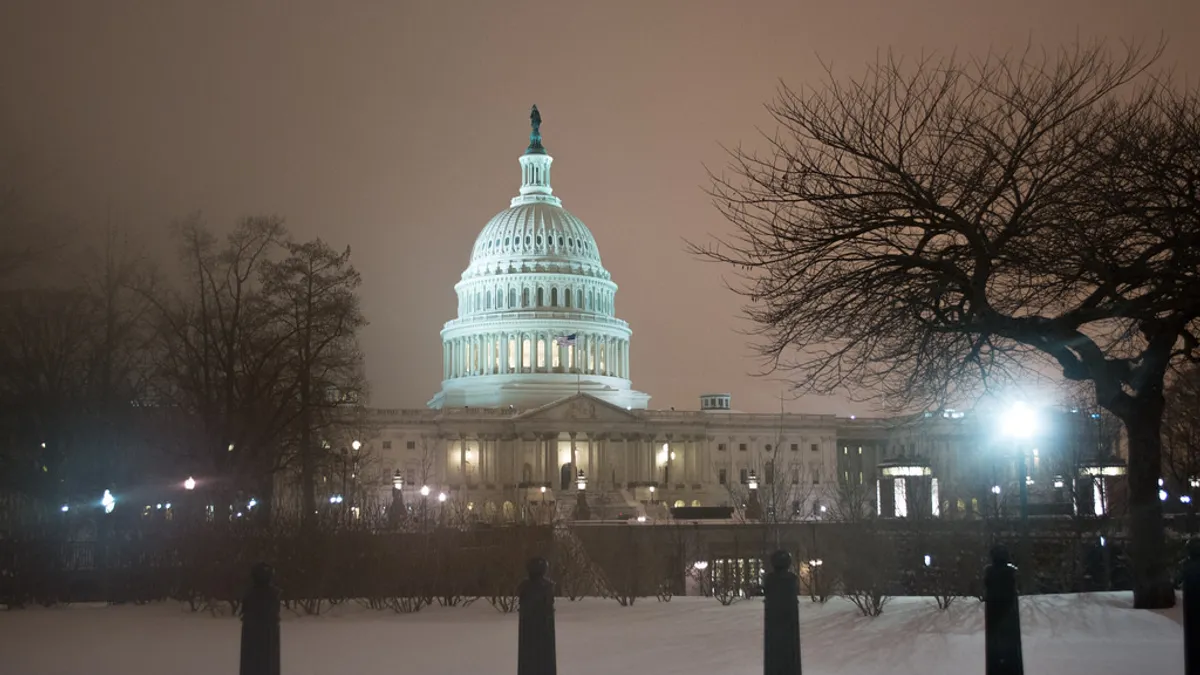Dive Brief:
- Energy groups cheered the passage of a $1.3 trillion omnibus spending package by the U.S. Congress, saying it includes vital funding to support clean energy research.
- The U.S. House and Senate both passed the omnibus bill on Thursday, averting a potential partial government shutdown. President Trump was expected to sign the bill, but on Friday morning tweeted he was considering a veto because it did not fully fund his border wall.
- The omnibus bill rejects proposed cuts to the Environmental Protection Agency and the Department of Energy, raising clean energy funding by nearly $1.5 billion.
Dive Insight:
Passed by the Senate in a 65-32 vote late Thursday, the omnibus spending bill would fund a number of energy and environmental initiatives targeted for deep cuts by the White House's budget proposal.
That proposal, released in February, would have cut EPA funding by nearly a third and reduced renewable energy and efficiency funding at DOE by two-thirds compared to currently enacted levels. The Advanced Research Projects Agency-Energy and the DOE Loans Office, two research and innovation programs popular in the power sector, would have been eliminated.
The spending bill, passed by the House earlier on Thursday, turns those priorities upside down, keeping EPA funding steady and increasing clean energy funding at DOE.
The agency's Office of Energy Efficiency and Renewable Energy (EERE) would see a 14% increase over 2017 enacted funding levels. The fossil fuel office would get a 10% increase, the nuclear office a 19% boost, and the science office would see funding rise 16%. The loan programs office would be preserved, as would funding for carbon capture and storage technologies.
Clean energy groups cheered the provisions, saying they will support the competitiveness of U.S. companies around the world.
"It’s clear that Congress recognizes the incredible value EERE, ARPA-E and the National Renewable Energy Laboratory bring to the research, development and deployment of many important electric power innovations," Gregory Wetstone, president and CEO of the American Council on Renewable Energy, said in a statement. " Without support for these critical energy R&D programs, the U.S. is at risk of falling behind other countries that are investing heavily in a rapidly growing global renewable energy industry."
Environmentalists framed the bill as a rejection of White House energy priorities.
"This was a complete repudiation of the president's attempt to gut some [clean energy] programs and outright eliminate the nation's early-stage clean energy innovation program, known as ARPA-E," Ken Kimmell, president of the Union of Concerned Scientists, said in a statement. "I hope to see Congress increase funding even more next fiscal year to help the United States remain on the cutting edge in this highly competitive field."
Cooperative utilities, meanwhile, praised the inclusion of $5.5 billion for the Department of Agriculture's electric loan program, which provides capital to rural co-ops for system upgrades, as well as $600 million to USDA to expand rural broadband access through pilot programs.
"Nearly 100 electric co-ops are investing in rural America by bringing high-speed internet access to homes, business and schools," the National Rural Electric Cooperative Association said in a statement. "Many more are exploring broadband and could access this funding stream."













